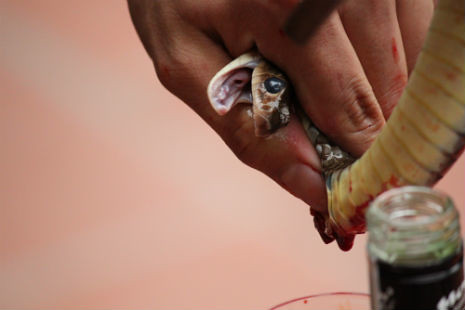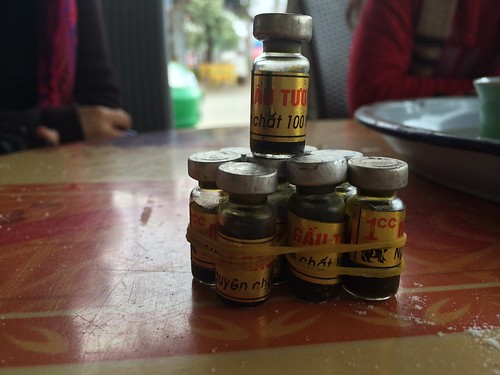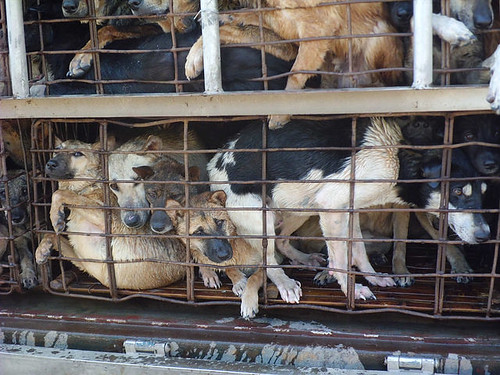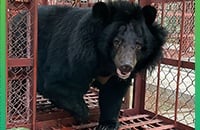Five tips for a cruelty free trip to Vietnam
02 December 2014
Vietnam has it all – friendly locals, bustling cities, dramatic mountains, white sand beaches, a diverse ecosystem and an incredible history.
Sadly, animal cruelty is still often connected with the tourism industry. But don't worry – arm yourself with the right information and it's easy to do the right thing.
Here's how to have a dream holiday without condoning animal cruelty.
1/ Don't go to "snake village"
It may have become a staple of gap year travel blogs, irresponsible celebrity chefs and cult films like The Beach, but a visit to "snake village" is far from an integral part of a trip to Vietnam.
It's impossible to verify where the snakes sold in Le Mat village on the outskirts of Hanoi are sourced but the restaurants have a bad reputation for also providing at-risk species for customers. Snakes are cruelly killed and consuming their bile is far from healthy. Worse still, the whole process is wrapped up in the kind of superstition that is behind the trafficking and consumption of rare species. Avoid.
2/ Don't try "exotic" liquors such as scorpion, sea horse, tiger cub or bear paw
In northern Vietnam it isn't too difficult to find bootleg rice wine with illegal wildlife products infusing inside. As disgusting as the concept may seem, some thrill-seeking tourists like to seek out such concoctions. Unfortunately, what may appear like fun is actually robbing Vietnam of its natural heritage. At-risk species commonly found in rice wine jars include sea horse, bear paws and even tiger cubs. Instead of condoning and funding wildlife crime, seek out and enjoy herbal infusions instead.
3/ Don't buy bear bile products in Halong Bay - or anywhere else
Despite being illegal, bear bile farming continues and bear bile products are still available in World Heritage site Halong Bay. Beware of any tour guides who attempt to bring you to a bear bile farm or try to sell you bear bile products.
Buying it is not only funding cruelty – it's also illegal. Stay cruelty-free. Stay out of jail.
4/ Don't purchase "weasel coffee"
So-called "weasel coffee" is advertised for sale in many cafes in city tourist areas. In reality the product is more likely produced from civet cats. While the coffee has become fashionable in many European countries it is a product of animal cruelty. Civets are fed a completely unsuitable diet almost entirely of coffee beans while being held in tiny cages. You'd be drinking their ground up faeces. Of course, much of the coffee being marketed as "weasel coffee" is in fact nothing more than ordinary coffee beans with a picture of a weasel or a civet on the front. Vietnam has great coffee. You'd be pretty dumb to drink civet poo.
5/ Don't be tempted to try dog meat
Dog meat is legal and readily available in Vietnam, but don't let that fool you. The dog meat trade is rife with illegality and animal cruelty. Don't mistake eating dog meat for a "local experience" – most locals don't. It's not eaten due to poverty or a lack of choice. It's largely eaten for luck. Dog meat is expensive with profits boosted by dog thieves stealing much-loved companion animals from the streets.
BACK










 Freedom after two decades: Moon bears Nang and Mua rescued
Freedom after two decades: Moon bears Nang and Mua rescued
 With heavy hearts we say goodbye to our beloved Tulip
With heavy hearts we say goodbye to our beloved Tulip
 Three moon bears rescued from notorious bear bile farming hotspots in Vietnam
Three moon bears rescued from notorious bear bile farming hotspots in Vietnam
